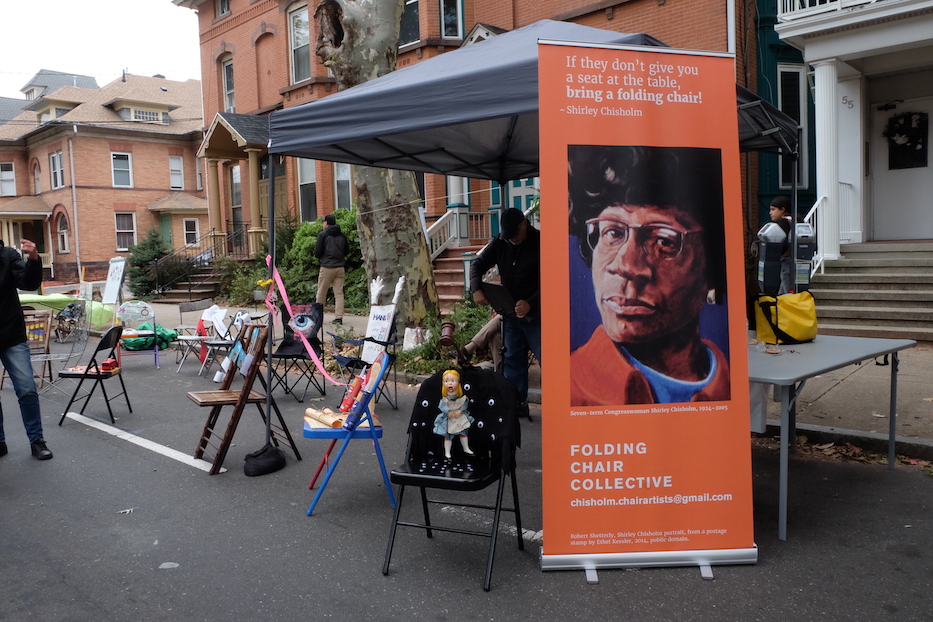
Culture & Community | Ely Center of Contemporary Art | Arts & Culture | Visual Arts
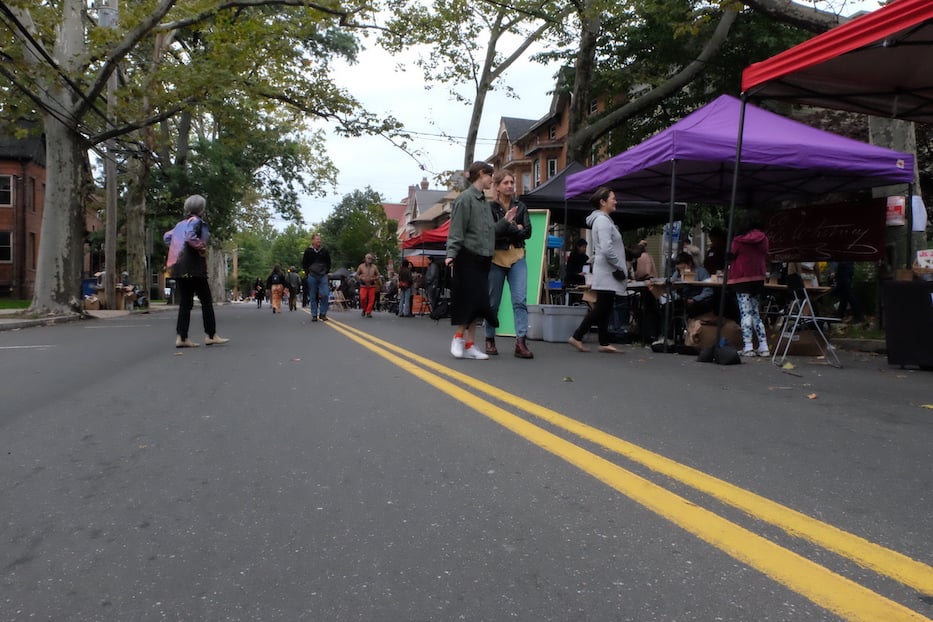
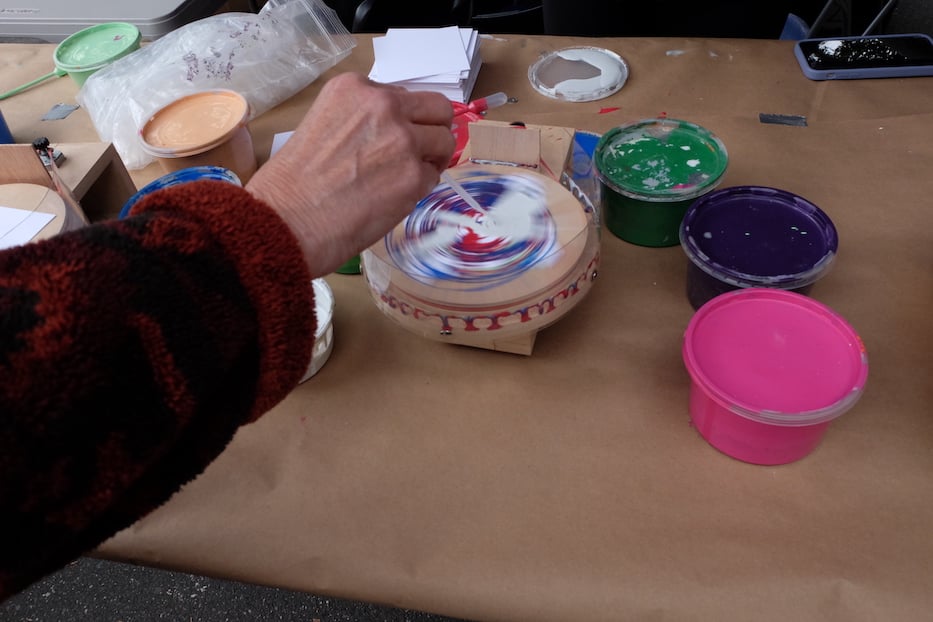
Lindsay Skedgell Photos.
Passersby stopped along a tent-lined Trumbull Street, taking in the scene. At one table, people created delicate, multicolored spiral paintings using eye droppers. At another, they learned to make cyanotype prints. A man walked by in a soft viking hat. A woman with pink hair followed not far behind him. The afternoon filled with laughter and conversation, with not a car in sight.
Sunday, Trumbull Street was closed off between Orange Street and Whitney Avenue to celebrate the Ely Center of Contemporary Art (ECoCA), which earlier this year bought its building in a successful effort to remain an arts anchor on the block. It is the second recorded time in the city’s history that Trumbull Street has been closed to traffic: the first was for Queen Elizabeth 45 years ago. This time, joked former Artspace New Haven director Helen Kauder, it belonged to the people.
“I thought it was incredibly successful,” said Debbie Hesse, gallery director at ECoCA. “Overall, I thought it was an incredible success to bring together almost 150 artists over eight collectives for sort of an energy surge in the neighborhood. We want to let people know that we are there, and we want everybody to get involved."
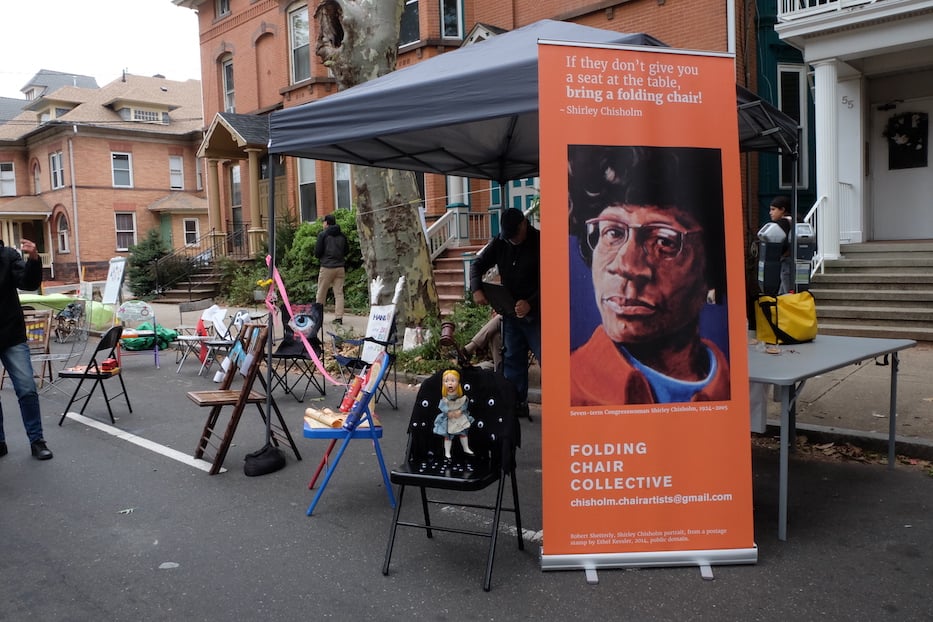
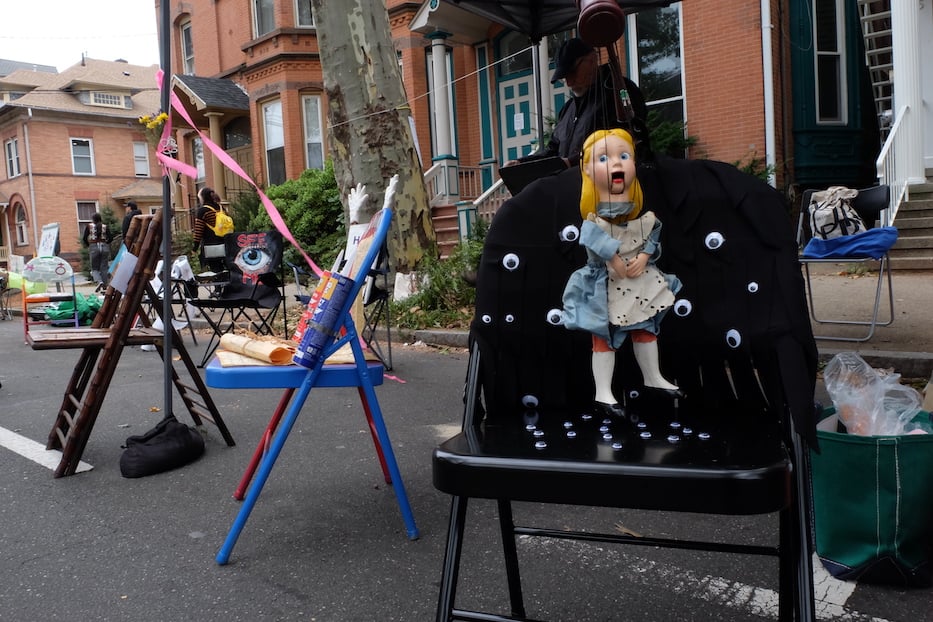
Pieces from the Folding Chair Collective. Lindsay Skedgell Photos.
She added that it was a chance for neighbors—many of whom are professionals who work on Trumbull during the day—to meet each other and learn what the Ely Center is all about. Both inside the building and on the street, members of artists’ collectives from across New England gathered to celebrate, sharing their work with both attendees and with each other.
Everywhere a person looked, there was art and artmaking. Halfway down the block, pieces from the nascent, Bethel-based Folding Chair Collective peeked out with political messaging, pro-choice slogans, and a variety of inspirational quotes. Beside the works, collective founder Elizabeth White said that she isn’t strict about who can participate in the collective: “The chairs just have to fold.”
The collective was born earlier this year, after the U.S. Supreme Court struck down Roe v. Wade in June. White said that the collective is a tribute to seven-term congresswoman Shirley Chisholm, who said, “If they don’t give you a seat at the table, bring a folding chair!” (Chisholm, who was the first Black woman elected to Congress and the first to seek a presidential nomination, famously said this about not just misogyny but also racism).
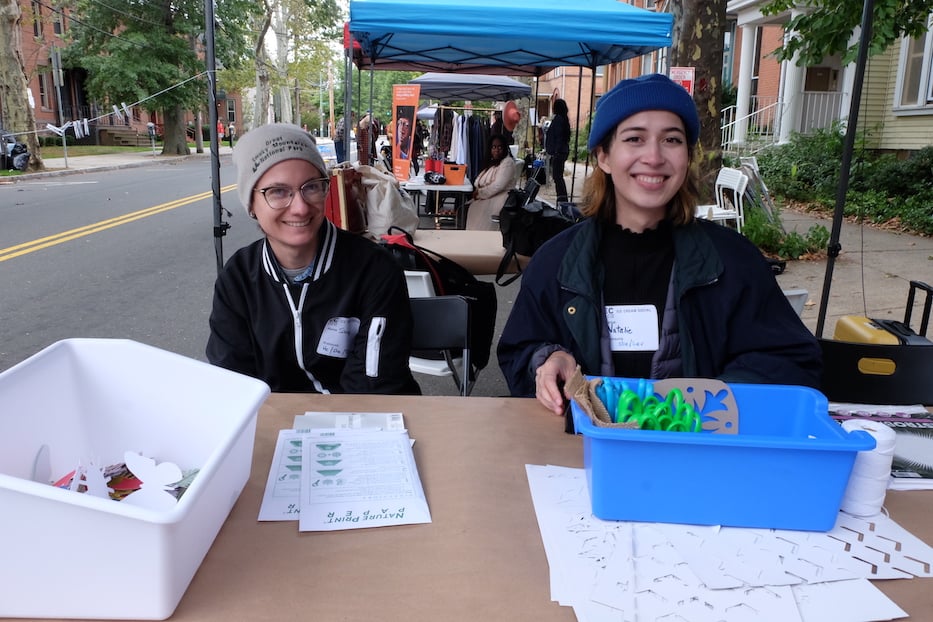
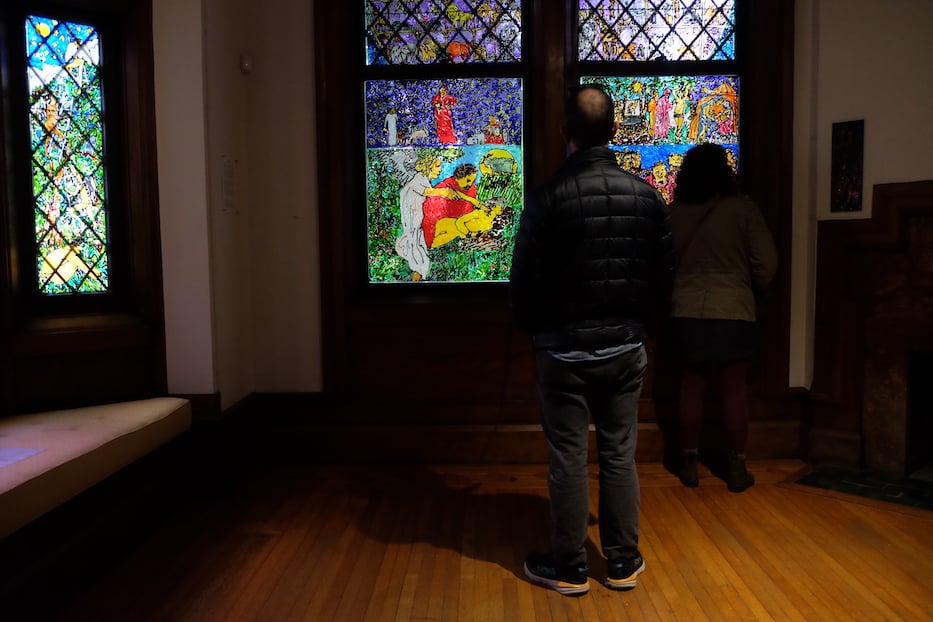
Top: Sibley Elise Barlow and Natalie Ortiz, both members of Ice Cream Social Art Collective.
To create and gather the chairs, White put out an open call to artists. As of now, the chairs rotate throughout different events in Connecticut; she ultimately envisions them traveling to various states throughout the country.
Sunday, one of the collective’s participating artists included Robert Becker. Becker had created a folding chair doused in red and blue spray paint and a copy of the U.S. Constitution, the words We The People ripped down the middle. The question What Will It Take? was pasted across the chair’s upper back.
Becker’s old bandmate took a guitar out and began playing behind the folding chairs, as Becker mentioned that he recently put out a musical collection entitled The Dream Sequence: A rock operetta of prophecy and promise.
“I found a red and a blue Liquid Nails in the same place,” he said. “Was it fate? Was it the universe calling me to make this?”
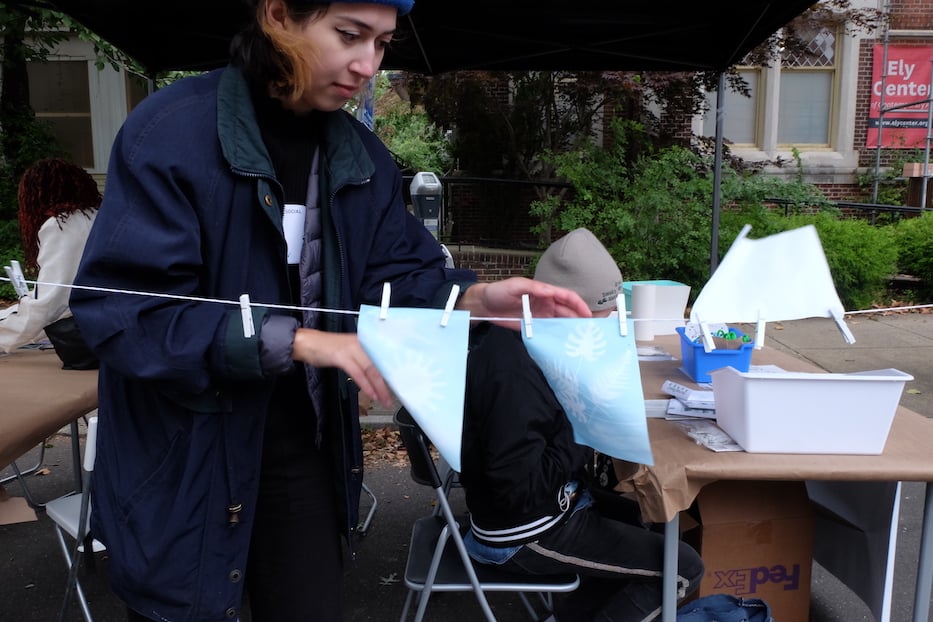
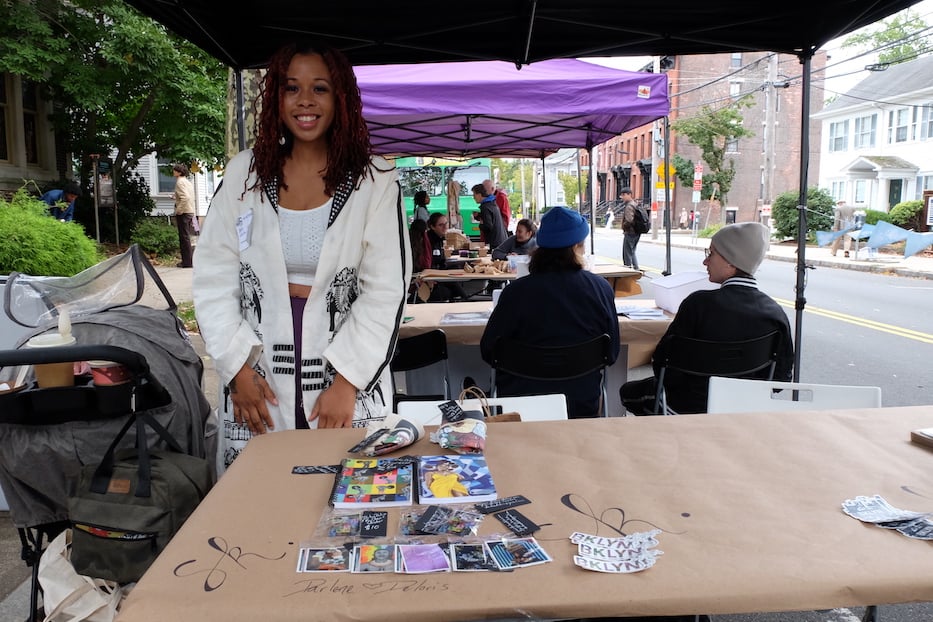
Bottom: Darlene Deloris of sk.ArtSpace Collective.
At the end of the block, SomethingProjects co-founder Suzan Shutan talked to a group of curious attendees about The Exchange, a statewide treasure hunt with two dozen artists running through Nov. 1 of this year. Across the state, she explained, various art projects have been positioned with coordinates that correspond to them. It often allows visitors to take something from the art sites that are discovered.
The project “explores what art is and can be,” Shutan said as she stressed the importance of art as a form of giving. The Exchange’s philosophy and creation revolves around this importance. During the afternoon, that exchange was clear as participating artist Susan McCaslin slipped this reporter an envelope with the letters MH, longitude, latitude, and a fragment of black ink.
Inside the envelope was her name and a block printed house. On the card’s reversed side, a piece of floral fabric was stapled above a bullet pointed list of clues which read nearly like a poem.
“This is my piece, Mother Home,” McCaslin said. “It was made for my mother. I actually have her with me now.”
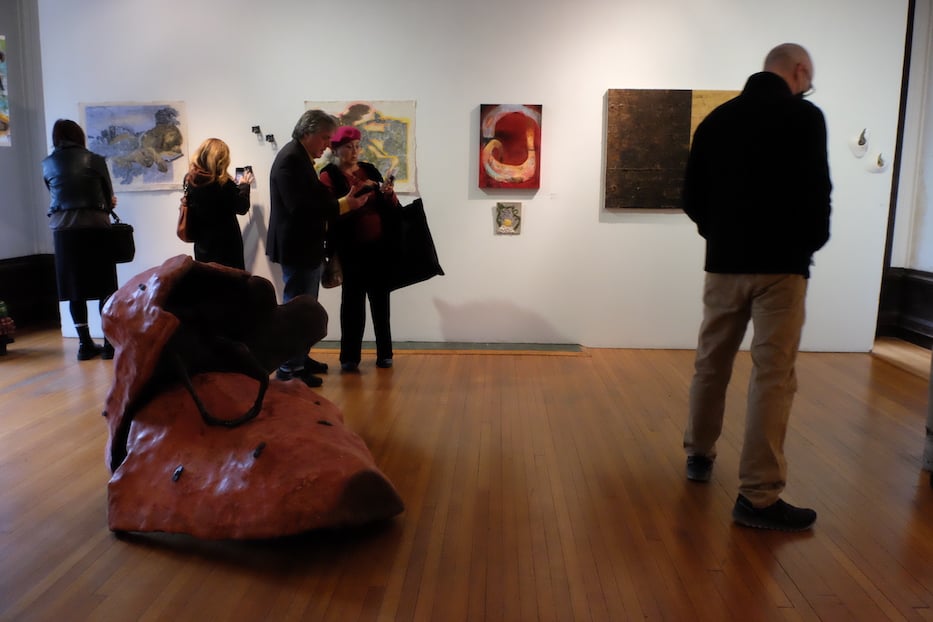
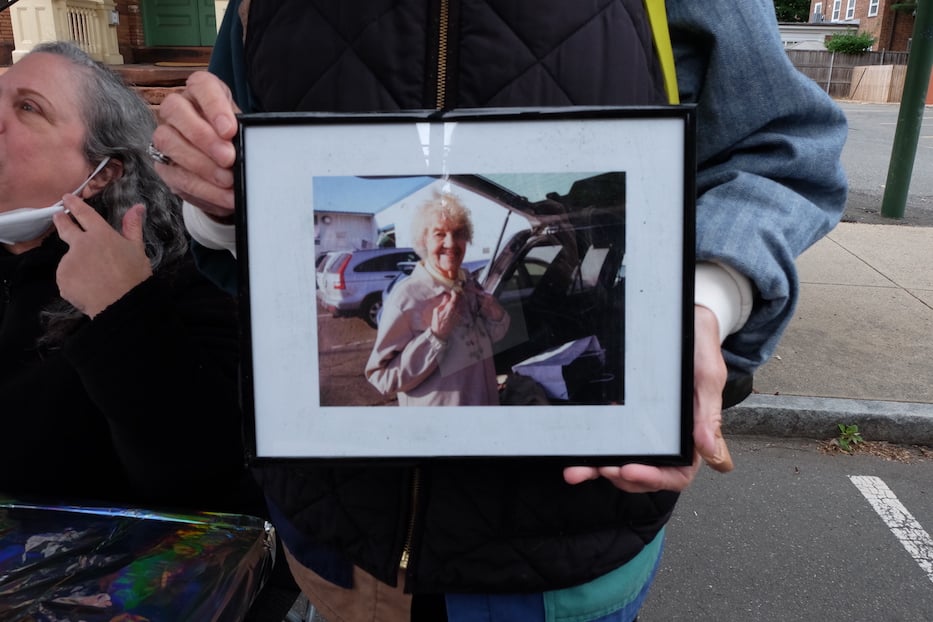
McCaslin pulled out a framed photograph of her mother from her backpack. She mentioned how much they used to love going thrifting together. Her mother is wearing an old tan jacket in the picture, standing in front of a section of parked cars.
Inside, the Ely Center’s doors opened onto window paintings refracting and tunneling light in an otherwise darkly lit room, part of Jonathan Weinberg’s collection GENESIS. Hung on the walls, Weinberg’s letterpress pieces revealed themselves in a contrasting black and white.
As Connectic*nt co-editor Zoe Jensen put it while discussing the museum’s interior space, “It’s amazing in there. It’s kind of a free for all and anything goes.”
Attendees circled and wandered in andout of the first floor’s exhibits, which hosted a zine making station and library from Connectic*nt, an installation featuring abstracted, textural shapes and forms by FEED, and works from sk.ArtSpace that incorporated gold fabric, billowing as it hung from brightly colored portrait paintings.
The second floor of the museum displayed works by Ice Cream Social, a collective based out of Port Chester, New York. There were also coordinates alongside art pieces from SomethingProject’s The Exchange art scavenger hunt.
The energy of attendees lasted throughout the afternoon’s celebrations. Kids wandered through the upstairs and downstairs in wonderment and marveled at a piece made of woodpeckers, a beehive, and a mask. People were open, curious, and eager to see what they would discover through the next doorway.
For Hesse and fellow organizers, that was the hope.
"We started something that we hope will grow," she said. "That will continue and that will grow. We wanted it to really be a project that was driven by art and art-making."
Learn more about the Ely Center of Contemporary Art at their website.

